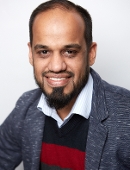Biography
Research Topics
Addiction, Biomedical Sciences, Cognitive Neuroscience, MRI, Neurobiology, Neuromodulation, Neurophysiology, Neuroscience, Prefrontal Cortex, Psychiatry, Schizophrenia, Systems Neuroscience
Addiction, Biomedical Sciences, Cognitive Neuroscience, MRI, Neurobiology, Neuromodulation, Neurophysiology, Neuroscience, Prefrontal Cortex, Psychiatry, Schizophrenia, Systems Neuroscience
Multi-Disciplinary Training Area
Artificial Intelligence and Emerging Technologies in Medicine [AIET], Neuroscience [NEU]
Artificial Intelligence and Emerging Technologies in Medicine [AIET], Neuroscience [NEU]
